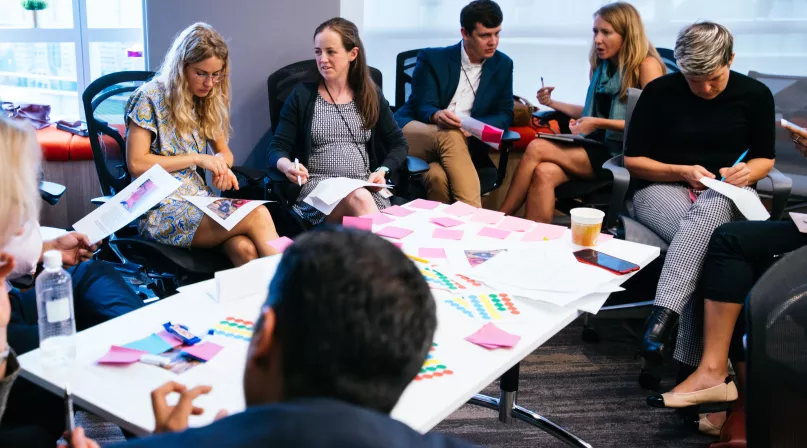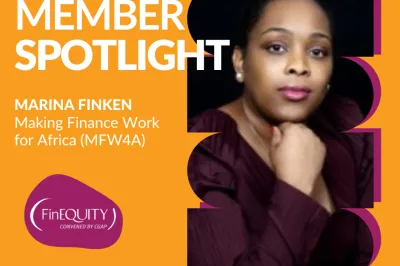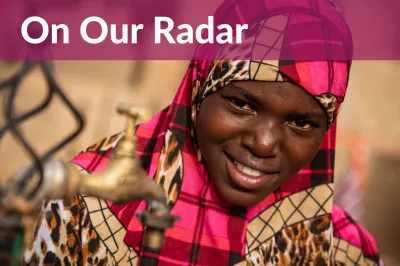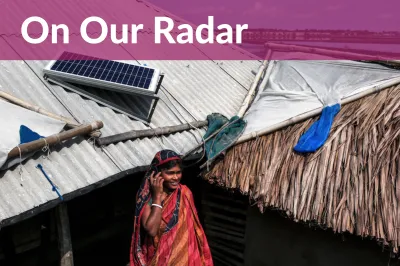FinEquity2020 and Beyond

With 1,500+ members and growing, FinEquity envisions a world where women have the capabilities to access, negotiate, and control financial services that improve their lives. We do this by providing a range of curated platforms for members to share experiences, discuss new ideas, document emerging good practices, and solve common challenges associated with increasing equitable access to, and use of, a broad range of financial services. We could not be prouder of the energy and commitment of our members to this shared goal.
Our Origins
Growing recognition of the persistent gender gap in women’s access to and use of financial services led to a renewed and increased focus on gender programming by CGAP members and Financial Inclusion thought leaders. Concern over the lack of collaborative approaches drove the need for a centralized hub on practical resources, lessons learned, and evidence of impact. This is how FinEquity came to be, four years ago.
Initially, FinEquity was organized into thematic working groups based on members’ priorities at the time: social norms affecting women’s financial inclusion, consensus-building around gender data collection, measurement and evaluation, and unpacking the challenges around women's access and use of digital financial services.
Fast forward to today - widespread understanding now exists that for low-income women, financial inclusion offers an opportunity to improve livelihoods and resilience while contributing to women’s economic empowerment outcomes. However, the level of empowerment depends on the various gender inequalities that stem from social norms and gendered roles in the economy. This is because empowerment requires not only increased access to financial services and economic opportunities but also ensures women have the agency to make their own choices and decisions around the use of financial services. In addition, financial market systems where providers have products and services that meet women’s needs and preferences as well as supportive policy environments are equally essential.
The Road Forward
Following the evolution of our diverse membership and priorities in the sector, FinEquity is now moving into our next phase. We are honing our thematic areas as we introduce more collaborative processes to generate solutions around common challenges. Engagement with our broader membership base, coupled with deep-dive consultations with leading research and programmatic stakeholders, has yielded our new learning agenda which will be organized around three main learning themes: Gender Transformative Solutions, Digitally Enabled Financial Inclusion and Impact Pathways. The Gender Transformative Solutions learning theme focuses on how to support the financial system to serve more women. The Digitally Enabled Financial Inclusion learning theme focuses on opportunities and challenges of doing so digitally. And the Impact Pathways learning theme is about measuring if gender transformation has occurred and how and if women are more economically empowered. These themes are not meant to be an exhaustive reflection of what is needed in the sector, but rather where FinEquity’s members currently have the most pressing need.
In anticipation of further discussions during #FinEquity2020 we’d like to share a preview of our initial priorities within each learning theme and hope this will allow us to more clearly identify key opportunities for engagement based on shared needs and interests:
Gender Transformative Solutions
Gender-transformative solutions for financial inclusion are focused on creating equitable financial systems that enable everyone, regardless of their gender, to overcome supply- and demand-side constraints and improve their lives and livelihoods on equal terms. Achieving such solutions requires a deeper understanding of the underlying causes of gender inequality (such as social norms), how they impact women’s financial inclusion and the incentives for different market actors to support shifts in norms. To this end, FinEquity’s current priorities within this learning theme are to promote learning and solutions focused on:
- Understanding the differentiated needs of women. Women are not a homogenous group, they have different financial service needs based on their age, location, and jobs/roles, in addition to their socio-economic context. Providers need to develop comprehensive value propositions and integrated solutions to address the needs of specific segments.
- Promoting equitable financial market systems where financial service providers have the incentives to proactively serve women clients, supported by a regulatory framework and infrastructure that enable women's ability to use and benefit from financial services.
Digitally Enabled Financial Inclusion
Financial services are increasingly delivered through digital technology. The pervasive gender gap in mobile phone ownership and usage, as well as other unique challenges associated with digital technologies, compounds challenges around women’s financial inclusion. Unfortunately, rather than expediting access to financial services, digitization often acts as a significant barrier. To bridge the divide and reach women with Digital Financial Services (DFS), an intentional and coordinated approach is required. To this end, FinEquity’s current priorities within this learning theme are to promote learning and solutions focused on:
- Understanding and addressing the capacity barriers associated with DFS - such as digital financial literacy (DFL) and its enablers.
- Understanding and unpacking the normative barriers impacting adoption and usage of DFS for women.
- Promoting design approaches that enable women to move from access to usage to impact. This requires collectively ensuring that the wants, needs, and realities of women are appropriately considered and addressed.
Impact Pathways
Much of the conversation around women’s financial inclusion has focused on whether we are narrowing the gender gap. While it is important to know whether more low-income women are accessing and using financial services, the gender gap in usage is not a barometer for impact. What matters are the material differences that financial services have on the lives of women who start using them, and how financial inclusion contributes to their resilience. To this end, FinEquity’s current priorities within this learning theme are to promote learning and solutions focused on:
- Understanding the pathways by which access to and use of financial services contribute to increasing women’s resilience.
- Moving the narrative from one of generalized impacts of financial inclusion on women to a more nuanced understanding of the types of outcomes we are trying to effect, and subsequently integrating relevant metrics into our work.
- Sharing and developing tools to integrate a strong gender analysis into the design of financial inclusion research and initiatives.
We look forward to working with you, during #FinEquity2020 and beyond, to identify key learning questions and activities within each theme. Within this member-driven community of practice which serves to connect, share, learn and influence - your voices and experiences are shaping the future of women’s financial inclusion.


